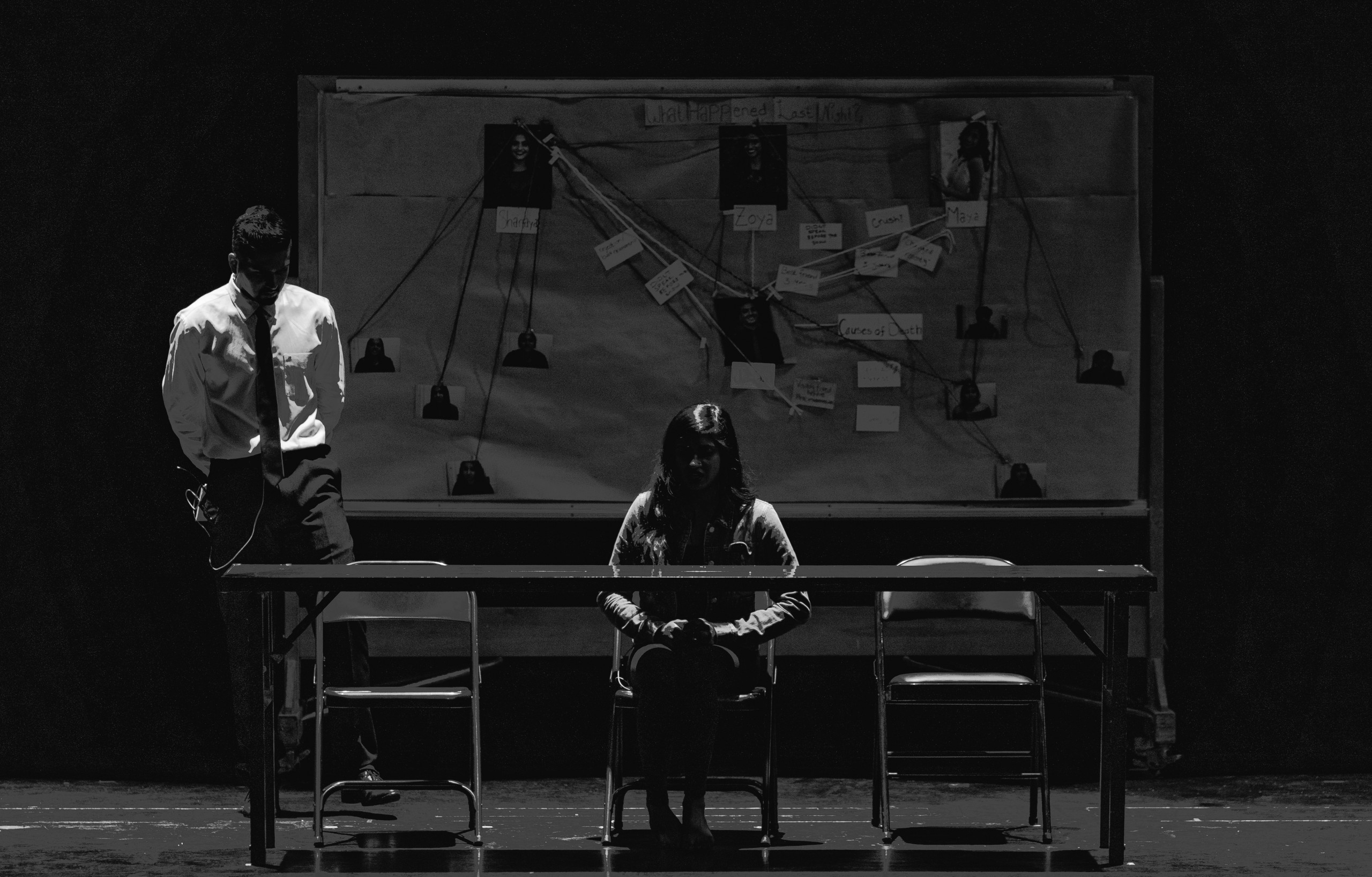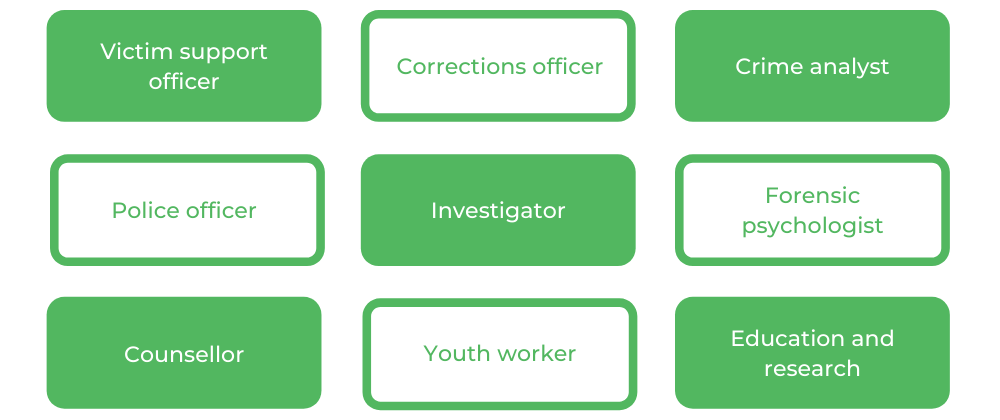So, you pretty much know all the details and info on studying Criminology and Psychology at RMIT — here’s a quick refresher if not!
But you want to know how people really feel about this dual degree?
Well, you’ve come to the right place. Meet Michelle, a RMIT Criminology and Psychology Graduate! We ask her all those questions you really want to know the answers to.
Let’s take a closer look!
Why should you study a Criminology and Psychology degree at RMIT?
Top 3 Pros of a Criminology and Psychology Degree
Top 3 Cons of a Criminology and Psychology Degree
Mistakes You Shouldn’t Make
Things to Know Before Starting RMIT Criminology and Psychology
What Makes this Degree Different
Motivations for Studying RMIT Criminology and Psychology
Potential Career Paths
Why should you study a Criminology and Psychology degree at RMIT?
A Bachelor of Criminology and Psychology sets you up for a career in the justice and human services field.
You’ll learn all the theories and practical skills you need to understand the psychology behind crime and how the criminal justice system works. You’ll have the chance to choose four electives from a huge list of fascinating subjects, all relating specifically to the degree.
Top 3 Pros of a Criminology and Psychology degree
#1: You can tailor it
“It’s just one of those degrees that you can kind of make your own a little bit,” Michelle said.
You have the option to start in the middle of the year, you can choose from a massive list of interesting criminology/psychology related subjects for which electives you want to do, there’s an internship elective and you can also travel overseas with it if you want to!
So, there’s definitely lots of options. You also get the best of both worlds with a bit of criminology and psychology!
#2: Practical skills
“We did some forensic interviewing — that was pretty good in terms of like, if you ended up being a person that worked in the justice system, being able to interview offenders,” Michelle said.
“We also did case management practice, so if you ended up working for corrections, knowing how to manage your caseload,” she added.
While the course is fairly theoretical, it still covers the practical skills you need for when you’re out in the work world!
#3: Travel opportunities
There is the chance to combine your studies with overseas learning experiences! Michelle was lucky enough to go twice during her degree.
She chose the elective Comparative Criminal Justice Systems and got to go overseas as part of the subject. “That was basically a whole group of us going on a trip to Malaysia and comparing the justice systems between Australia and Malaysia, and how they handle cases,” Michelle said.
“I think the one main thing that we were looking at was people using drugs because there’s very different penalties between Australia and Malaysia when it comes to using drugs and trafficking them,” she explained.
Michelle also did a short-term program in Aarhus, Denmark where she took part in the “Youth, Drugs and Alcohol: Social Science Approaches” elective at the university there.
Make sure you check out the Global Opportunities at RMIT for international exchange experiences!
Top 3 Cons of a Criminology and Psychology degree
#1: A lot of theory
Now, this isn’t necessarily a con but this degree is quite theory heavy which can mean it’s quite intense at times!
“There definitely is a lot of theory to remember in terms of all the psychology classes, like, big names and big theories. It’s very similar in criminology as well as there’s lots of theorists and stuff to learn and remember,” Michelle explained.
As long as you stay on top of it and organise your time well, you’ll be fine!
#2: A rush between classes!
Since, the RMIT buildings are a little scattered, sometimes, you’ll have to make a run from one class to the next to make sure you’re on time!
Michelle told us that the teachers “usually let you out five or ten minutes earlier” so you have enough time to go to the next one. But it can get a little hectic!
#3: Well, that’s it!
So, we don’t really have another con for you! At the end of the day, it’s a really interesting degree with the best of both worlds, a little bit of criminology and psychology. You definitely won’t get bored.
Any regrets?
When we asked Michelle this question, she said, “I’m pretty chuffed with choosing this degree.” So, we’re pretty sure that says a lot about it!
What do you wish you had known before starting Criminology and Psychology at RMIT?
Now, this is something good to know: it’s not like the crime shows! There’s more theory and paperwork involved!
Michelle told us, “When I started the degree, I thought I would be a forensic psychologist and I’d be interviewing serial killers and things like that, which apparently a lot of people want to do.”
“I think a lot of people come into this degree, because they watch crime shows and they think, oh, cool, this will be like CSI or something like that and it’s actually not,” she said.
“I think if people can be realistic about their expectations, it’s an amazing degree that gives you lots of opportunities,” Michelle said.
So, as long as you’re going into the degree because you’re generally interested in it and not just because all those crime TV shows have convinced you it’s so cool, then you’ll really enjoy it!
What makes this degree different from the ones offered at other universities?
#1: First uni to pilot the degree
“I know that RMIT was the first one to pilot Psychology and Criminology in combination as a dual degree,” Michelle said.
“I wanted to do something that involves both and I guess that kind of helps you realise which one is more interesting to you, like both are still really interesting to me, but the crime was a little bit more,” she explained.
The two degrees fit really well together and it is fascinating learning about the psychology of crime!
#2: The staff
“The first psychology lecturer that we had, he was working as a psychologist and a lecturer, so it’s someone that’s putting their experience into practice,” Michelle said.
That’s definitely the best way to learn because you can also ask them about what you can expect from a career in psychology or criminology.
Michelle also told us that some of the lecturers and teachers were doing their PhD or conducting various research projects.
#3: Enrol mid year
“Another good perk is that you can enrol mid year which is quite good,” Michelle said.
“It does mean that the classes are a little bit different in order as opposed to the start of the year but it wasn’t a detriment,” she said.
So, perhaps you’re wanting to travel or maybe you’re wanting to earn some money before starting the degree but don’t want to wait a whole year — it’s not a worry because you can enrol mid year!
What inspired you to choose Criminology and Psychology at RMIT?
“I’ve always been keen in kind of understanding why people do what they do and what goes on in people’s heads and stuff like that,” Michelle said.
“I thought I’d become a psychologist and the crime stuff would just be interesting and now, it turns out I’m on my way to becoming a criminologist,” she added.
And that’s the cool part about this degree — you get to do both criminology and psychology in which the content fits really well together and sometimes overlaps. You can then choose to pursue one of them more or perhaps do a bit of both — forensic psychologist, youth worker etc.
What are the possible career paths?
Depending on whether you’re more interested in the criminology or psychology side, you can either go on to work in the justice and human services system or continue your studies to become a clinical psychologist. And if you love both, there’s also the possibility of becoming a forensic psychologist!
These are some of the career paths you could find yourself working as:
-
- Victim support officer
- Corrections officer
- Crime analyst
- Police officer
- Investigator
- Forensic psychologist
- Counsellor
- Youth worker
- Education and research
…and there are way more!
Tanna Nankivell is a Senior Content Writer at Art of Smart Education and is currently in Germany completing a year of study for her double degree in Communications (Journalism) and Bachelor of Arts (International Studies). She has had articles published on Central News – the UTS Journalism Lab and wrote a feature piece for Time Out Sydney during her internship. Tanna has a love for travel and the great outdoors, you’ll either find her on the snowfields or in the ocean, teaching aqua aerobics or creating short films.





